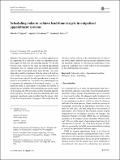Scheduling rules to achieve lead-time targets in outpatient appointment systems
Author(s)
Sivakumar, Appa Iyer; Nguyen, Thu Ba Thi; Graves, Stephen C
Download10729_2016_Article_9374.pdf (641.3Kb)
OPEN_ACCESS_POLICY
Open Access Policy
Creative Commons Attribution-Noncommercial-Share Alike
Terms of use
Metadata
Show full item recordAbstract
This paper considers how to schedule appointments for outpatients, for a clinic that is subject to appointment lead-time targets for both new and returning patients. We develop heuristic rules, which are the exact and relaxed appointment scheduling rules, to schedule each new patient appointment (only) in light of uncertainty about future arrivals. The scheduling rules entail two decisions. First, the rules need to determine whether or not a patient's request can be accepted; then, if the request is not rejected, the rules prescribe how to assign the patient to an available slot. The intent of the scheduling rules is to maximize the utilization of the planned resource (i.e., the physician staff), or equivalently to maximize the number of patients that are admitted, while maintaining the service targets on the median, the 95th percentile, and the maximum appointment lead-times. We test the proposed scheduling rules with numerical experiments using real data from the chosen clinic of Tan Tock Seng hospital in Singapore. The results show the efficiency and the efficacy of the scheduling rules, in terms of the service-target satisfaction and the resource utilization. From the sensitivity analysis, we find that the performance of the proposed scheduling rules is fairly robust to the specification of the established lead-time targets.
Date issued
2016-08Department
Sloan School of ManagementJournal
Health Care Management Science
Publisher
Springer US
Citation
Nguyen, Thu-Ba T., Appa Iyer Sivakumar, and Stephen C. Graves. “Scheduling Rules to Achieve Lead-Time Targets in Outpatient Appointment Systems.” Health Care Management Science (August 8, 2016).
Version: Author's final manuscript
ISSN
1386-9620
1572-9389